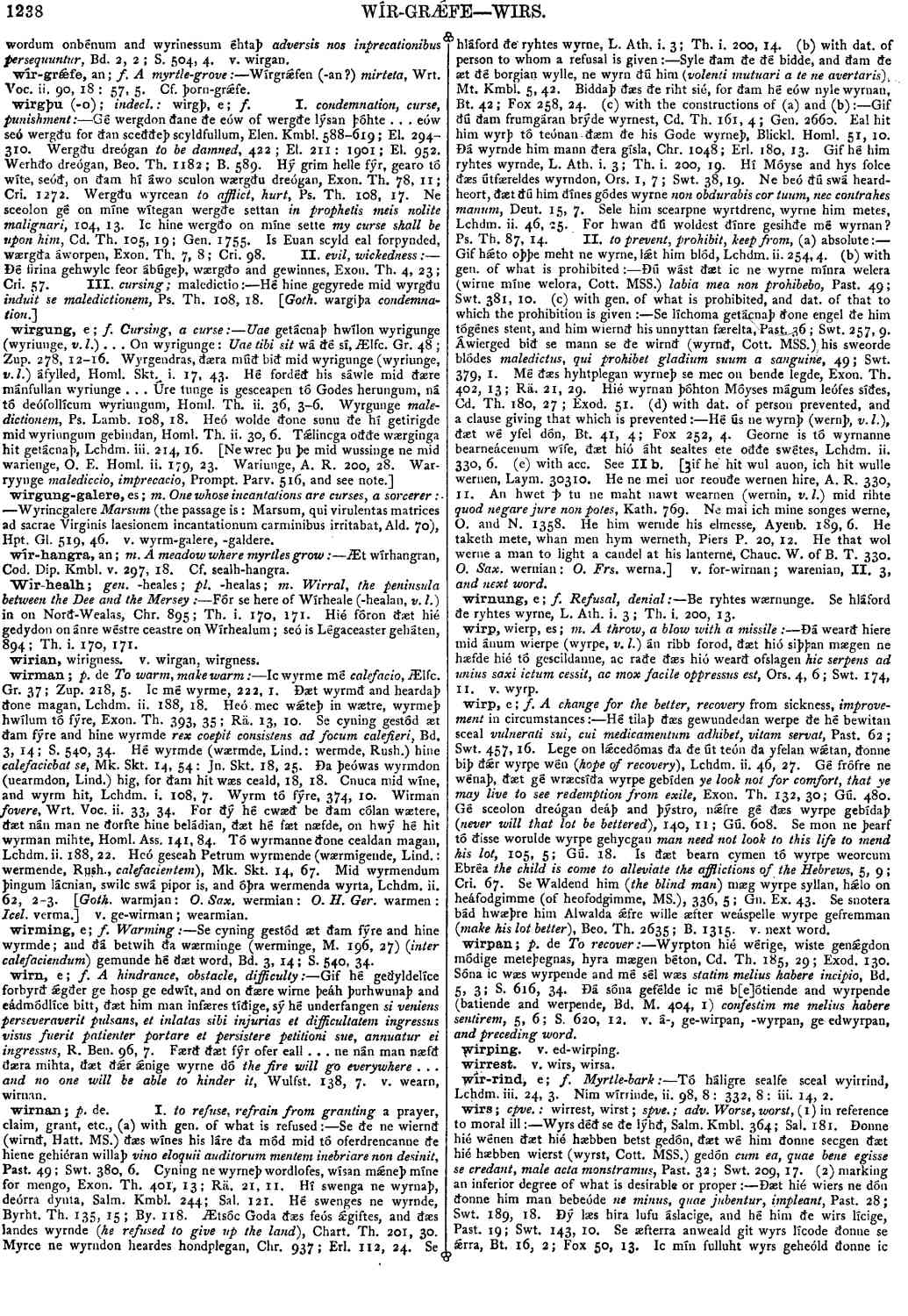wirs
- adverb
-
Wyrs déð se ðe lýhð
- Salm. Kmbl. 364 ;
- Sal. 181.
-
Ðonne hié wénen ðæt hié hæbben betst gedón, ðæt wé him ðonne secgen ðæt hié hæbben wierst (wyrst,
- Cott. MSS.
cum ea, quae bene egisse se credant, male acta monstramus,
- Past. 32; Swt. 209, 17.
-
Ðæt hié wiers ne dón ðonne him man bebeóde
ne minus, quae jubentur, impleant,
- Past. 28; Swt. 189, 18.
-
Ðý læs hira lufu áslacige, and hé him ðe wirs lícige,
- Past. 19; Swt. 143, 10.
-
Se æfterra anweald git wyrs lícode ðonne se ǽrra,
- Bt. 16, 2 ;
- Fox 50, 13.
-
Ic mín fulluht wyrs geheóld ðonne icbehéte,
- L. Edg. C. 9 ;
- Th. ii. 264, 8 :
- L. Ath. iv. proem. ;
- Th. i. 220, 2.
-
Hé ðý wyrs meahte þolian ða þráge,
- Met. 1, 76.
-
Se arcebiscop wénde ðæt hit sum óðer mann ábiddan wolde, ðe hé his wyrs trúwude and úðe,
- Chr. 1043 ;
- Erl. 169, 28.
-
Oft hit gesǽleþ dæt his ǽhta weorþaþ on ðæs onwealde, ðe hé ǽr on his lífe wyrrest úþe,
- Blickl. Homl. 195, 4.
-
Ðý læs him ðý wirs (wiers,
- Cott. MSS
- Past. 36 ;
- Swt. 247, 7.
-
Hí wyrs geférdan (geférdon máran hearm and yfel v. ll. ), ðonne hí ǽfre wéndan,
- Chr. 994; Th. i. 241, col. 2.
-
Eów wyrs gelomp,
- Exon. Th. 142, 1 ;
- Gú. 637.
-
Ne wæs hyra ǽnigum ðý wyrs, ne síde ðý sárra,
- 394, 19 ;
- Rä. 14, 5.
-
Hé bið on ðæt wynstre weorud wyrs gesceáden ðonne hé on ða swíþran hond swícan móte,
he will be assigned to the host on the left hand by a sentence too stern to allow him to pass to the right hand,
- 449, 23 ;
- Dóm. 75.
-
Hit ðé wyrs ne mæg hreówan ðonne hit mé déð,
you cannot repent it more bitterly than I do,
- Cd. Th. 51, 12 ;
- Gen. 825.
-
Heora weóldan ða him wyrrest ǽr on feóndscipe gestódon,
- Ps. Th. 105, 30.
-
Wyrst,
- Met. 24, 60.
Bosworth, Joseph. “wirs.” In An Anglo-Saxon Dictionary Online, edited by Thomas Northcote Toller, Christ Sean, and Ondřej Tichy. Prague: Faculty of Arts, Charles University, 2014. https://bosworthtoller.com/36023.
Checked: 1